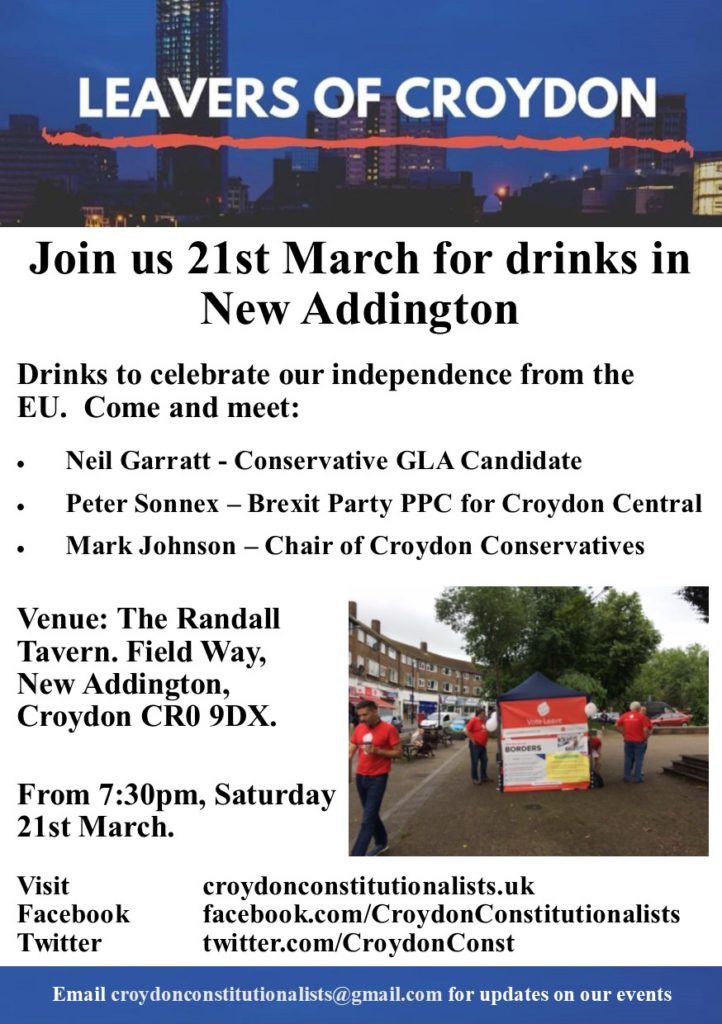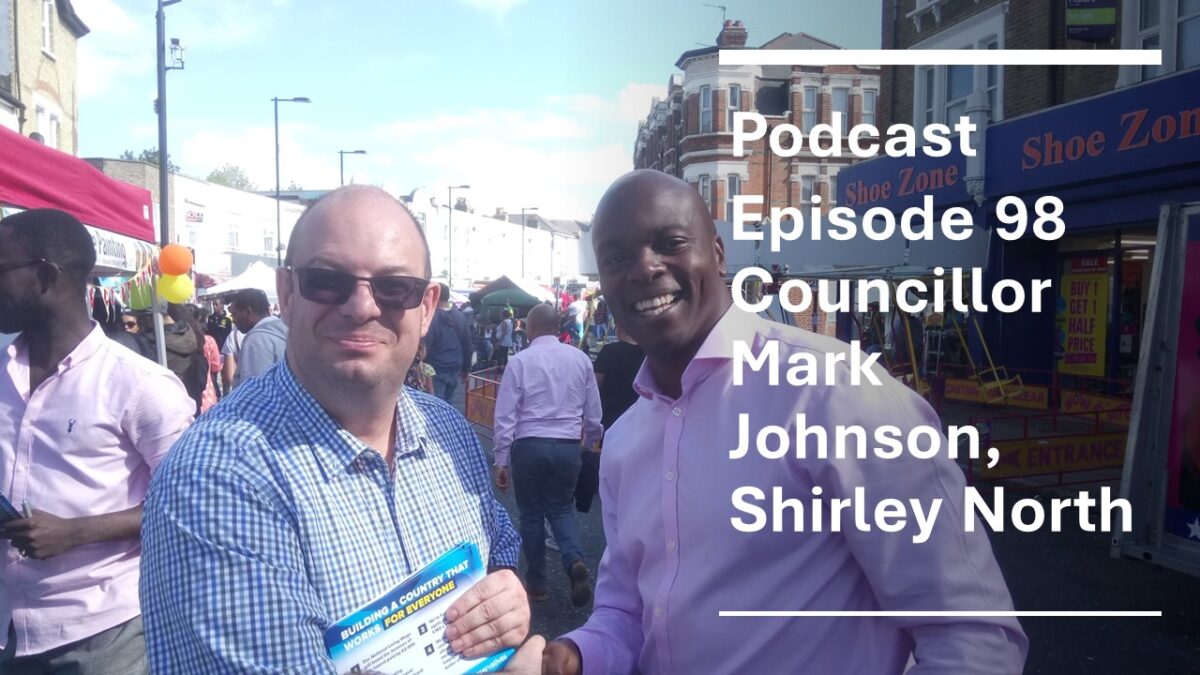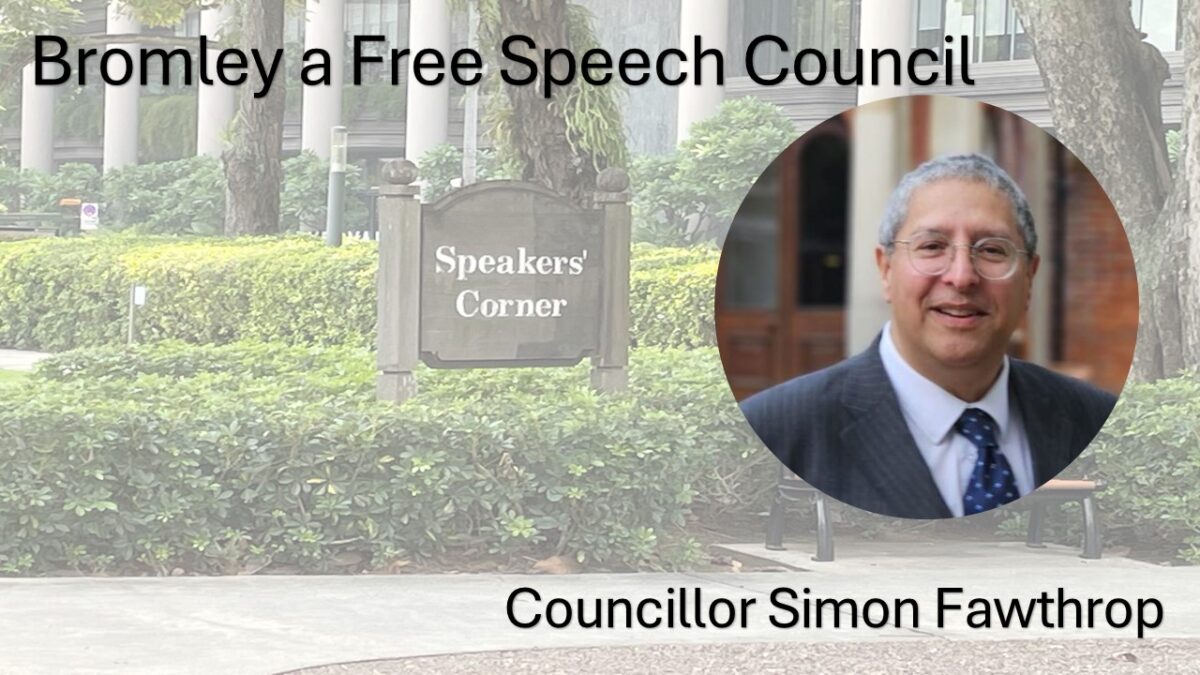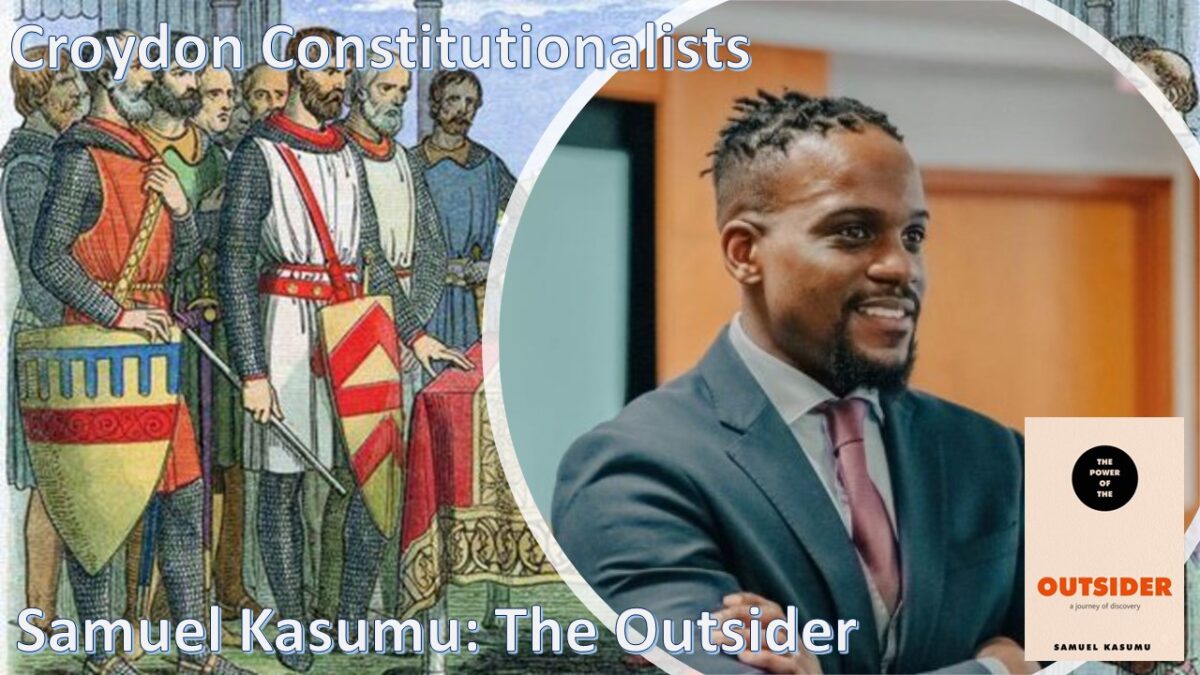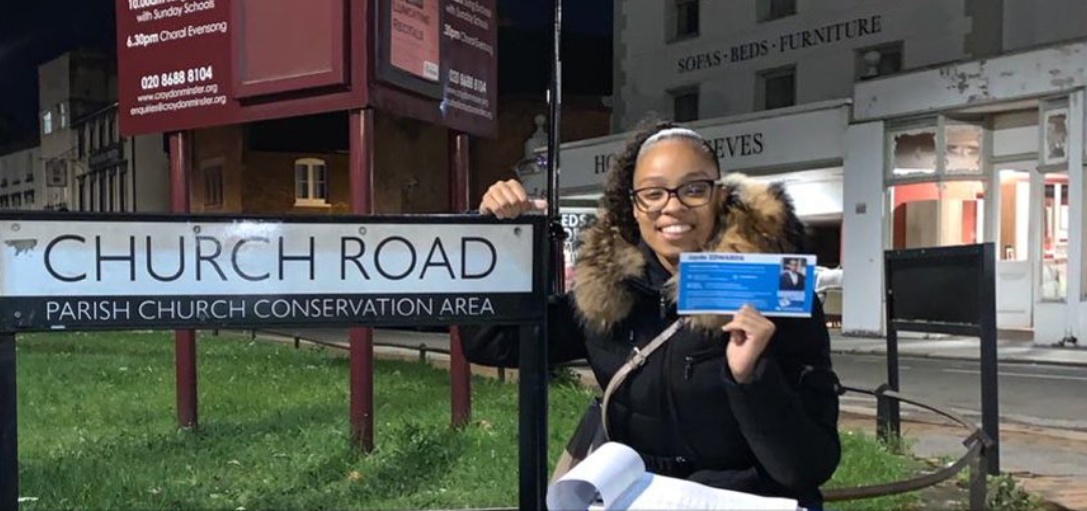We are joined by Mark Johnson, Conservative Councillor for Shirley North in Croydon and Brexiteer. We reminisce about the 2016 Referendum campaign and discuss his experiences as a Croydon councillor.
Category: Conservatives
Bromley a Free Speech Council
Bromley Council has recently passed a policy to enshrine free speech in its procedures, code of conduct and constitution. We spoke with the Chairman of the Executive, Resources and Contracts Committee at Bromley Council, Councillor Simon Fawthrop.
“We have seen multiple court cases where employees have been unduly penalised, or Council’s have supressed free speech”
Could you briefly introduce Bromley Council and the borough to our readers?
Bromley Council is the largest borough in Greater London, a mainly suburban borough in the south and east around Chislehurst, Orpington and Biggin Hill and more urban in the North towards Crystal Palace. The Borough has the longest road network in greater London and is about 50% greenbelt land. It is run by the Conservatives and currently solvent!
“Roy Chubby Brown isn’t to everyone’s tastes, for instance, but did the residents of Lancaster really need their council to save them from smutty humour”
Why did Bromley decided to become a Free Speech Council?
Essentially for two reasons, the initial reason was to protect employees from being persecuted for speaking freely, to allow them to whistle-blow without repercussions. We have seen multiple court cases where employees have been unduly penalised, or Council’s have supressed free speech, examples highlighted by the Free Speech Union (FSU) groan with examples of short-sighted intolerance and outright legal error.
Blue comedian Roy Chubby Brown isn’t to everyone’s tastes, for instance, but did the residents of Lancaster really need their council to save them from smutty humour by cancelling his show?
What of Basingstoke and Deane, which investigated an elected councillor under its code of conduct for use of the term ‘year zero’? (It’s allegedly offensive to the victims of Pol Pot, in case you were wondering.)
Was it really wise of Sandwell Metropolitan Borough Council to support its employee’s injunction against citizen journalist Julian Saunders, only for a High Court judge to throw the case out with a reminder that, in this part of the world, journalists are free to speak and write?
And think again about visiting the Yorkshire town of Calderdale if you’re a broad reader – its library squirreled away books by gender-critical authors in a bid to suppress the fashionable heresy that men are men, and women are women.
“it will ultimately allow us to challenge other organisation to have the same high stands that we have when it comes to free speech”
The second reason is that political speech is under increasing pressure to only follow orthodox lines. Original and critical thinking, left field views and challenge are often frowned upon and subject to peer pressure to conform to the orthodoxy. The changes we have and are making, give additional protection to Councillors, recognising that we are representatives of our electorate and that codes of conduct in an HR style put unwarranted constraints on free speech. Why would residents elect someone who is not able to speak up for them? These changes reaffirm those extra freedoms and protect elected representatives, but it goes further, it will ultimately allow us to challenge other organisation to have the same high stands that we have when it comes to free speech.
“allowing employees to whistle-blow and speak freely is important to good governance”
Aren’t councils about potholes, bins, schools, and social services. What makes this something for the council to get involved in?
Yes, Councils are about all of those things and more, but Councils can be innovative and set a good example. Having a policy on licensing or planning or how a Council looks after their employees doesn’t prevent them doing all those other things. More importantly having a policy helps them do those things, allowing employees to whistle-blow and speak freely is important to good governance.
If other authorities want to become Free Speech Councils, where do they start?
If they want, they can contact me and I can give them the Bromley policy to copy, alternatively they can contact the Free Speech Union (FSU) and see if they can be of any assistance. The FSU were tremendous help to Bromley Council in progressing this policy and we couldn’t have done it without their help and guidance. For assistance below are links to copies of our policy and my comments when I introduced the policy at committee.
Podcast Episode 86 – Samuel Kasumu: The Outsider
We are joined by Samuel Kasumu. A former Special Advisor to PM Boris Johnson and 2017 Tory candidate in Croydon North, Samuel was recently in the running to be the Tory candidate to take on Sadiq Khan in next year’s London Mayoral election. Samuel talks to us about his experiences in Downing Street, Tory politics and his recently published book “The Power of the Outsider”.
You can get hold of Samuel’s book Waterstones and Amazon:
YouTube Contents:
00:00 – Intro
01:40 – Conservative Candidate
06:20 – Croydon North & Steve Reed
10:05 – Downing Street Days
14:00 – Mayor of London
25:40 – New Book
31:55 – Website & Events
34:25 – Outro
You can find out more about Samuel on his website and on Twitter.
End of transition: Brexiteers on Brexit – Part 1
Now we have left the Transition Period we asked Brexiteers if they feel Brexit is now complete, for their hopes and their predictions for the future. Part 1 below. Part 2 up at https://croydonconstitutionalists.uk/brexiteers-on-brexit-part-2/
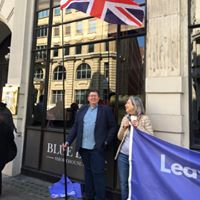
“Time will tell, first impressions suggest it’s not perfect but could be called done”
Dan Liddicott of the Independent Libertarians.
Did Brexit get done? Time will tell, first impressions suggest it’s not perfect but could be called done.
How do you hope the U.K. will use the new found freedoms? To shrink government interference and regulation in individual lives, leading to economic prosperity and greater individual freedom. I hope we will find a way to make CANZUK happen, or something like it, without giving up sovereignty.
What constitutional reform would you like to see happen next? A written constitution and bill of rights which reduces the power of the state, protects individual rights, reduces the tendency of democracy to become mob rule, and makes government more local and accountable.
What do you think is next for the EU? Continued slide to greater technocracy, more regulation, further loss of voice and liberty for individual citizens, expansionist outlook seeking to control more territory.
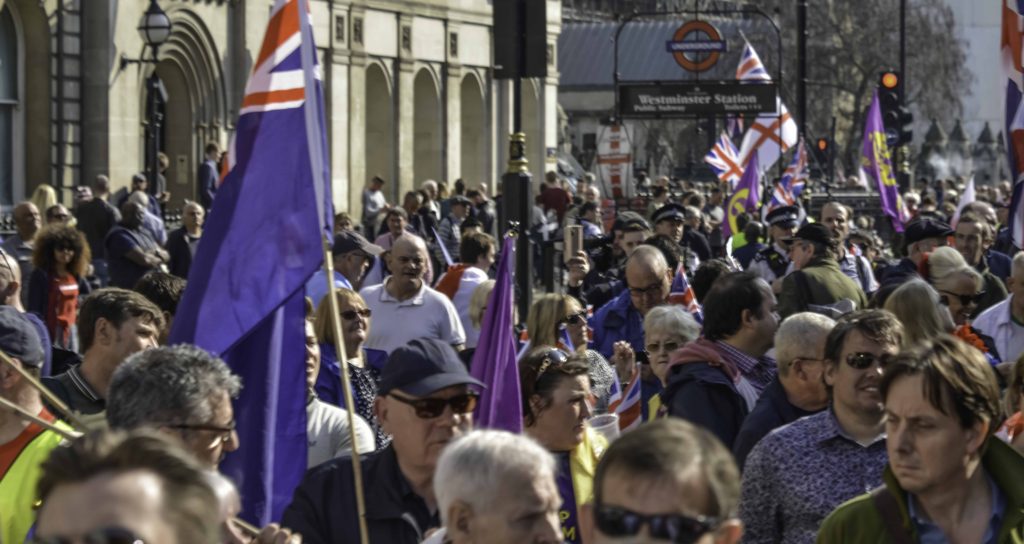
“Even “ Rejoiners” will become “ Rejoicers” as they see the real value of UK sovereignty”
John Broadfoot political campaigner and charity founder.
Did Brexit get done? Yes at the end of the day we have taken back control of our laws, borders and money, though it is a worry that for some reason the UK/EU Trade Deal did not include 80% of our trade with the EU – financial services. One can only hope there is a good reason for this – but it is vital and a big concern. We inevitably had to make some concessions but even with the fish we will have virtual total control in five and a half years. As our economy booms, politically and practically I believe , the EU will not be able to hold us back by increasing tariffs. Even “ Rejoiners” will become “ Rejoicers” as they see the real value of UK sovereignty, freedom to do our own trade deals and controlling our population numbers to better plan future infrastructure – hospitals, school, transport etc and keep us safe from terrorist attacks.
How do you hope the U.K. will use the new found freedoms? It is not a perfect deal but with the return of sovereignty and democracy we are now in a position to make our own trade deals and boom as an independent entrepreneurial trading nation, outside of the declining undemocratic EU. Already we have made over 60 worldwide trade deals and we have carried out more vaccine injections that the whole of the EU put together. The EU will continue to decline and despite safeguards on tariffs that they have built in, they won’t be able to prevent the UK from booming. This will set an example to other EU sceptic member countries and they will be looking for the exit door too. Especially with the Franco/German push even further towards an EU super state that further diminishes local democracy and accountability.
What constitutional reform would you like to see happen next? Most urgent is Westminster and the role of the Speaker – so clearly not fit for purpose and so abused by Remainer Bercow during the Brexit process. Plus MPs must deliver on the Manifestos on which they were elected – not just choose their own personal approach, and ignoring the wishes of the majority of their constituents when they get to the House. Next important is reforming. reducing , possibly abolishing, the ridiculously huge , undemocratic House of Lords. Finally, new rules on the Honours system to stop cronyism and abuse. You don’t get an honour for just doing your job – e.g. an Ambassador.
What do you think is next for the EU? Very interesting and difficult to predict with Merkel and Macron not likely to be around by the end of the year. With the UK gone the Franco/German axis will try to dominate EU policy. If the UK does well and horrendous EU youth unemployment continues then some of the newer Eastern European members may look for an out or major reform.
“No matter how incompetent Croydon Labour were and how we as an opposition pointed it out, Tony Newman just blamed central government. Too many voters believed him”
Robert Ward Conservative Councillor Selsdon and Addington Village.
Did Brexit get done? Yes, Brexit got done, and better than I had expected. Removing the ECJ from the equation was vital. What is now important is to move on and make the most of it. We have already wasted far too much time bickering.
How do you hope the U.K. will use the new found freedoms? I would start with replacing the Common Agricultural Policy by supporting our farmers to use the land in a more environmentally friendly and productive way. This was the most controversial policy when we joined and one which for me, who voted to stay in in 1975, found the most egregious. Reform was promised because it was so disadvantageous to the UK but it came very slowly indeed because it had been designed as a mechanism to subsidise French farmers. That failure was one of the things that changed my mind about the EU.
What constitutional reform would you like to see happen next? A big problem is local government. That’s something that seems to work better in some other countries. Local people understand better than here which politician is responsible for delivering what and vote accordingly. In the UK the vast majority do not and as a consequence vote on national issues. That is in my opinion a major contributor to the mess that Labour has got us into in Croydon. No matter how incompetent Croydon Labour were and how we as an opposition pointed it out, Tony Newman just blamed central government. Too many voters believed him.
What do you think is next for the EU? I hope they do well but the signs are not good. They are refusing to learn the lessons of Brexit. Their solution to failure is always more EU. Criticism of that line is also very muted. The BBC isn’t the only national broadcaster that follows the EU-can-do-no-wrong line.
“The Brexit debacle proved that MPs, in this case remain leaning MPs , were not to be trusted and voted against the wishes of their voters, that cannot happen again”
Ian Woodley, SDP organiser in Surrey.
Did Brexit get done? Yes, sort of. I think time had come to be pragmatic and move on. Despite the Labour party grudgingly voting for the deal, they are clearly positioning themselves to “improve” the deal which in their terms means weaken it and a Labour government would end in BRINO. The government need to prove the benefits before the 2024 election as we may find much of the good work undone. Leavers should learn the lesson of 2016 in that rather than celebrating the referendum result and taking our foot of the gas we needed to close it out. This isn’t the end of the matter.
How do you think the UK will use its new found freedom? This is an area where the current government and I part ways. They are classic neo liberals and will look to turn us into a global buyer of cheap goods whereas the strategy I favour is to rebuild our industries and positively favour UK produced goods and services, we need to put the needs of our own people first.
What constitutional reform would you like to see happen next? As a Social Democrat this is a big issue for us. The Brexit debacle proved that MPs, in this case remain leaning MPs, were not to be trusted and voted against the wishes of their voters, that cannot happen again. We would introduce proportional representation and abolish the House of Lords whilst we were at it. A personal beef of mine is that if MPs choose to swap parties mid-term then they should be asked to stand at a by-election. Whilst all of the switchers were punished in the 2019 election we had to put up with them for the previous 3 years.
What do you think is next for the EU? Tough to say, I don’t see anything happening quickly but the lack of British money and our steadying influence the differences between North, South and Eastern Europe will become more apparent. I really feel for those countries in the Euro as they are well and truly stuffed, our escape was made easier by not having to worry about currency. Watch youth unemployment in Southern Europe, that can no longer be exported to the UK.
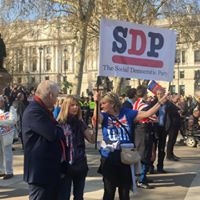
Podcast Episode 40 – Scotland Special with guest Alasdair Stewart
We are joined by Alasdair Stewart, the former Chairman of the Croydon Conservative Federation, for a discussion of Scottish politics. We discuss the SNP Government’s response to Covid, the Highers Results scandal, minimum drinks pricing and the new Scottish Hate Crime Bill. We then consider the new Scottish Tory leader, the demise of the Labour Party and the prospects for the 2021 Holyrood Elections and a potential IndyRef2.
Also see our article on the Scottish Libertarian Party https://croydonconstitutionalists.uk/interview-with-tam-laird-leader-of-the-scottish-libertarian-party/


Podcast Episode 36 – Mini-Budget, Council Job Cuts, Purley Skyscraper, BBC & an interview with Jayde Edwards
We discuss the reopening of pubs and gyms, the Mini-Budget, Croydon Council job cuts, the Purley Skyscraper and the BBC’s latest antics. We then have an interview with Jayde Edwards, a local Conservative Party activist who stood in the Fairfield ward by-election last November. We chat with Jayde about her campaign, issues affecting young people in Croydon, the Black Lives Matter movement and how she is inspiring more young people to get involved in politics locally.
You can read our previous interview Jayde at https://croydonconstitutionalists.uk/interview-with-jayde-edwards-the-conservative-party-candidate-for-council-by-election-in-fairfield-ward/ and follow her on Twitter.
We ask Jayde about:
- How do you feel the Fairfield campaign went?
- Looking back what are your thoughts on the treatment you received from real and social media?
- You wanted to “inspire young people, I also want to bring something new to Croydon – a new passion and a new energy”. We saw large crowds out to campaign for you. What’s the lasting effect of their politically engagement?
- In your campaign you focused on “Westfield and the promise that was given to residents”, and “Knife crime and the lack of opportunities”. What are your views on where we are now on both of these issues?
- What are your thoughts on the General election win and the more recently the impact of the lockdown?
- Looking at your Twitter, you hold a more nuanced view than many on the Black Lives Matter movement. How do you think we best move forward?
- We recently hosted a podcast with people of faith talking about how their faith impacts their politics. How do you feel you faith impacts your political view?
- Lockdown is lifting, what’s next for you?
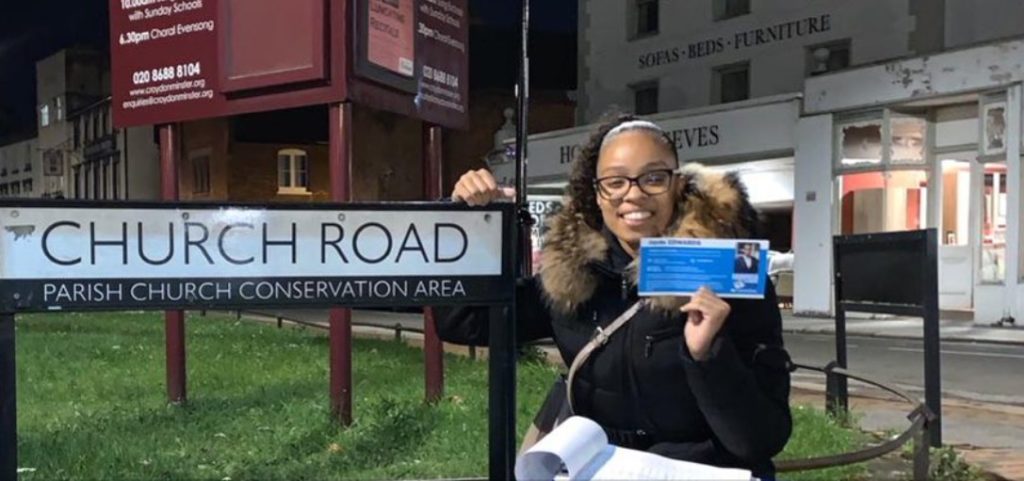
Podcast Episode 30 – Alasdair Stewart: COVID & the Media, Croydon’s Finances & US Presidential News
We are joined by Alasdair Stewart, the former Chairman of the Croydon Conservative Federation, as we discuss the media’s reaction to the COVID crisis and in particular their recent treatment of Dominic Cummings.
We also consider the great news about the Nissan plant in Sunderland, Croydon Council’s dire financial position and some recent developments in the 2020 US Presidential campaign.
We then chat with Alasdair about his experiences in politics, his time as the Chairman of the Croydon Conservative Federation and his thoughts on politics in Croydon.
Alasdair in the podcast:
“I’m sure many people in Croydon can remember, the 23% increase in council tax that Croydon Labour had to push through the last time the council’s finances got into this kind of terrible state”
“in Croydon, is that when Labour win control of the council everyone feels they only listen to their voters in the north, that delivered them their seats, and similar complaints are leveled against the Conservatives when they were running the council when they would only focus on the south of the borough. Anything that motives the Elected Mayor to think of the whole borough would be good for local democracy”
and from his interview:
“I’d seen the damage they had done to Scotland, whether it be the Heath Service, with Education or even with the government’s finances and I was quite frankly terrified of the idea of the SNP propping up a Labour administration in Westminster.”
“How disappointing it is when you’re speaking to people and they say how unhappy they are about how the council might be doing things, but then also say they aren’t going to vote”
“local members were not just incredibly positive for Brexit and wanting to leave, but also a proper Brexit”
“One of Croydon’s problems is the fact it is effectively a two party competition. It is incredibly partisan and entirely divided. With the Conservatives in the south primarily, Labour in the north and everyone fights over the centre”
“When they were in power the Conservatives, the Conservative Croydon administration built more council houses than this administration under Labour”
“We need some more voices for the ordinary British person, we know from recent elections the climate change warriors, and the lefty socialists are not representative of the country as a whole…. I would encourage more normal rational people to get involved, have a voice and share their voice”

Interview with John Broadfoot political campaigner and charity founder
John Broadfoot is a familiar face on the campaign trail in Croydon. John has been an active participant in many Conservative campaigns, was a regular campaigner with us during the EU referendum and subsequently delivering Leave Means Leave leaflets. A resident of Shirley, John worked for Shell UK OIL for 33 years and now runs the rugby charity SOS Kit Aid.

John thanks for taking the time to speak with us.
You have campaigned in a number of elections, what first got you involved in political campaigning?
I reached the age of 62 in early 2010 and suddenly realised that I didn’t want to spend my next ten years on this planet under a Labour Govt! Though I am a Capitalist at heart, sometimes I have Socialist Capitalist leanings when I read for example Amazon/Google /Apple are avoiding massive UK taxes. But socialists are always hopeless at running the economy and always run out of money, leaving huge debts/deficits that have to be repaid (Healey/Brown etc). So I decided I ought to play an active part in making sure this didn’t happen and the fact that Croydon Central was a real marginal made it all the more meaningful. I then got really interested in the Westminster bubble and how the world’s oldest democracy really works. Brexit proved that it is not at all fit for purpose when a majority Remainer Parliament can completely disregard the democratic votes of a Leave UK.

Do you have any interesting memories or stories from the campaign trail?
I found canvassing door to door very enjoyable and rewarding. It was very refreshing to see people quite happy to talk about issues though it was also disheartening to see many people not being interested in the future of their country at all. It should be compulsory to vote by law as in Australia.
I also remember being with Gavin Barwell at his by election count in 2015 when it was 5am in the morning, we were on our 5th exciting, nervous, recount , but emerged victorious with a huge majority of….. 165 – then exhaustion took over!!

“As an ardent Brexiteer it amazed me how seemingly intelligent people regardless of party so undervalued/missed the importance of basic democracy – having 100% UK laws made by 100% UK accountable MPs”
What struck you most about the EU Referendum campaign how did it differ from party politics you have been involved in?
As an ardent Brexiteer it amazed me how seemingly intelligent people regardless of party so undervalued/missed the importance of basic democracy – having 100% UK laws made by 100% UK accountable MPs. Remainers were quite happy apparently to have many UK laws made by unaccountable, unelected bureaucrats in Brussels. What happened if an unelected Trump like figure ran the EU – you would be powerless – you cannot remove someone you didn’t vote for. Control of your population numbers is logistical not political. You cannot plan future long-term infrastructure like hospitals, roads, schools etc if you don’t know your future population numbers. With freedom of movement you cannot plan properly because you have no idea of these future numbers. When you build a boat a vital component is knowing how many people it will carry. I could not comprehend how Intelligent people do not realise the importance of democracy and population control – neither of which are political they are basic human rights. One size does not fit all but you can still have very, very close cooperation on the environment, security, sciences, education etc – you don’t need to be married!
What are your hopes now for Brexit?
Providing we get a proper exit and a future trade agreement with the EU, the UK will positively boom outside of the EU – making its own trade deals with the 90% of world trade outside of the declining EU. Democracy will return to the UK ,as the EU becomes increasingly more federal, which will inevitably decline as people on the continent realise that one size does not fit all and that countries like Greece and Germany are just too different to run as one. They will see a democratic UK booming outside of the EU and will want to exit too.
One area we differ on is the threat of Global Warming. As believers in free speech, we want to give you the chance to say what you think the country should be doing now on environmental policy?
The virus will pass and we will be better equipped in the future for sure but the biggest threat to the world without question is global warming – climate change. We need a global approach to climate change but as two of the world’s biggest most powerful countries are dictatorships you will never get a global approach. Plus you have an American President in Trump who is a complete climate change denier. Who will be the first USA President on a four year term telling USA voters that they must switch off their air conditioning and drive smaller cars long term. USA is 3-4% of the world’s population but burn 25% of the world’s energy. Can you imagine when India/China want energy parity ? India would have an additional 200 million cars to match USA ownership. So the UK can only do what is within its control and we are showing world leadership.
“but for SOS all this unwanted kit would end up needlessly in scarce UK/Irish landfill sites. SOS has distributed over £6 million pounds worth of kit to a quarter of a million disadvantaged youngsters in 44 countries around the world”
You set-up your rugby charity following a trip to Romania. What drove you to do this, and can you tell us a bit about the charity?
One half of the world throws away things that the other disadvantaged half wants/needs. SOS Kit Aid collects good condition second hand/new rugby kit no longer wanted by UK schools, rugby clubs, kit manufacturers and other sporting bodies like the RFU/WRU etc. This is because kit is grown out of, sponsors are frequently changed, kit manufacturers have unsold outdated old stock – yet the kit is in great condition and but for SOS all this unwanted kit would end up needlessly in scarce UK/Irish landfill sites. SOS has distributed over £6 million pounds worth of kit to a quarter of a million disadvantaged youngsters in 44 countries around the world. We have saved 250 tonnes of kit being disposed of and we have saved over 750 tonnes of harmful CO2 emissions because new kit does not need to be manufactured – our SOS kit replaces it. SOS has proudly won three environmental awards and four social inclusion awards.

What do you see as the future work of SOS KIT AID?
Our SOS blueprint has been tried and tested over 18 years and we know would work for all other sports, plus other items like furniture, cycles, computers, books etc. The International Olympic Committee have recognised this and are considering launching it across all Olympic sports. We estimate over a million pounds worth of rugby kit is thrown away every year – we are still hardly touching the surface!
How can people help out?
Simply by volunteering via our website www.soskitaid.com. If you have commercial storage available free of charge or can offer low cost/free transport -please contact us !
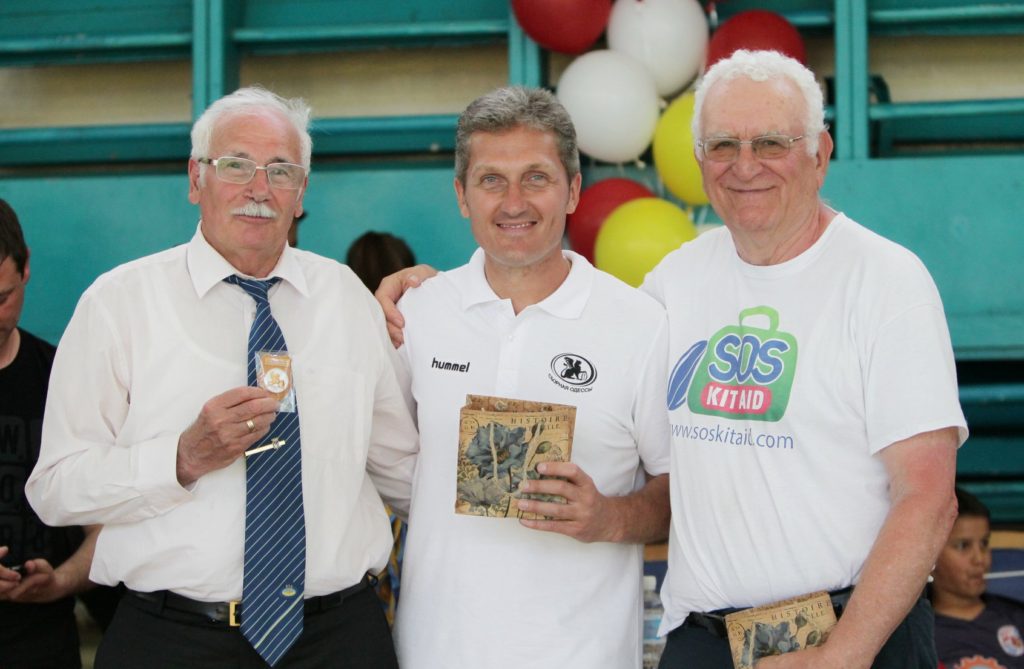
“carry out the promises of their manifesto on which they were elected and not just whatever they fancy once they have been elected – it’s called democracy and the power of the people!”
Lastly we have a fairly new government, one you helped campaign for. What do you hope to see from Boris over the next few years?
Simply organise a successful, exciting, Brexit that enables a free ,democratic, entrepreneurial UK to thrive throughout the world and restore accountability/democracy back to the UK. But also to work incredibly closely with our close European partners. Much reform needed to Westminster – both the House of Lords and the House of Commons – both too dated and currently not fit for purpose. Ensure that MPs know they are delegates who do the bidding of their constituency/party voters , carry out the promises of their manifesto on which they were elected and not just whatever they fancy once they have been elected – it’s called democracy and the power of the people!
John thanks again for your time. John can be followed on Twitter at https://twitter.com/JohnBroadfoot and find out more about SOS KIT AID at http://www.soskitaid.com/.



Interview with Selsdon and Addington Village Councillor Robert Ward
Robert Ward Councillor for Selsdon and Addington Village, was first returned in local Croydon elections in 2018. He is a former engineer, decision analyst, and project manager. Robert wrote extensively for the now defunct Croydon Citizen, and is now writing for Conservative Home.
Robert thanks for your time.
Tell us a bit about your background.
My father was an electrician and my mother a school secretary. I’m the first in my family to go to university, or even be educated beyond the age of fifteen, thanks to the Butler Education Act of 1944, an expression by the way of One Nation Conservatism that transformed the education of the working class.
My father was a life-long blue-collar Conservative but like many young people, I was more left wing. I went to every political group at university except the Conservatives. I wasn’t committed to any ideology; I was just curious. I got to listen to Harold Wilson, Roy Jenkins and the less well-known Paul Foot of the International Socialists, the forerunner of the Socialist Workers Party.
I started work as a railway signal engineer but job prospects in the UK were poor at the time so I took a job working for a French company in the Middle East. I later joined Shell and an American oil company living and working in many countries, coming back to the UK when my children got older. It was only after I was made redundant that I took a serious look at politics.
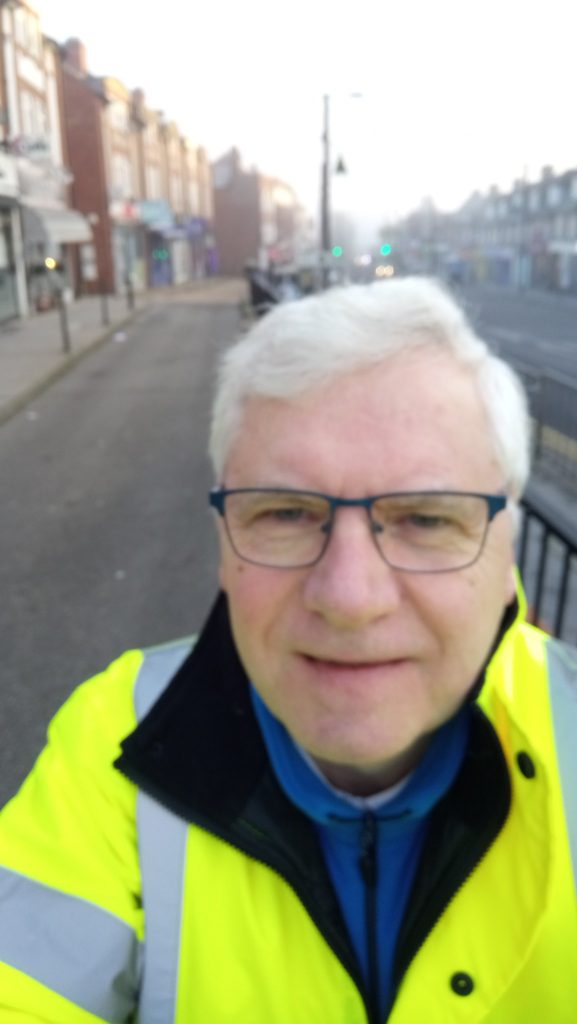
“I was frustrated that so much of what I saw in the media was left-wing biased. There was no balance. Conservatives care as much as any, perhaps more, about equality of opportunity, helping the disadvantaged and generally making the world a better place”
We first came to know you as a writer for the Croydon Citizen. How did you get involved, and please tell us a bit about writing for it?
I was frustrated that so much of what I saw in the media was left-wing biased. There was no balance. Conservatives care as much as any, perhaps more, about equality of opportunity, helping the disadvantaged and generally making the world a better place. Yet the material online was all written from a left-wing point of view, advocating left-wing solutions, many of which have failed over and over again but still were being put forward for yet another try, doomed to failure. Working people pay the price.
I wanted to redress that balance and also present reasoned arguments on policies about which I had no preconceived idea and had not made up my mind. Some of my articles were less good than others, partly because I tried to produce something on a regular basis, but I’m very glad I did it. The Croydon Citizen, and Tom Black in particular, were very helpful.
We certainly feel Croydon misses the Citizen. What do you think is the future for local journalism here in Croydon?
I agree. This is a tough question. Journalism costs money and people don’t want to pay, and there is only so much advertising revenue. The Croydon Citizen gave it as good a try as it was possible to do and it didn’t work. People think more globally and seem to follow celebrities in large numbers via social media. Political discussion is a minority pursuit especially given the continuing left-wing media bias even though the majority of the population does not share that view. I am not optimistic.
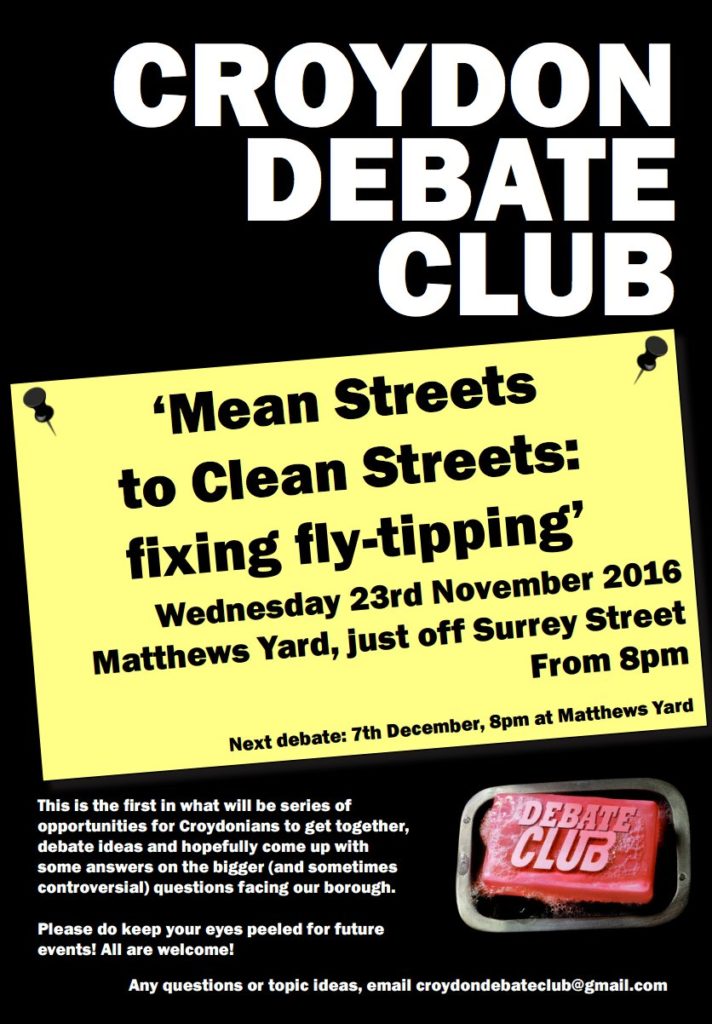
You also set up the Croydon Debate Club. How did that come about?
Although the Croydon Citizen was a great way to present a different message, I thought that constructive face to face discussion could be stimulating and rewarding and that was equally missing. I therefore set up the Debate Club. I tried different venues and formats. The audience varied from maybe ten people to more than fifty. A celebrity speaker at a central Croydon location on a mid-week evening was the most successful. Getting a good speaker and finding an interesting subject was the challenge.
You had a famous meeting where Gavin Barwell spoke, and there were disturbances outside. Do you have any memories from that event?
That was an interesting evening. I remember you came along and were a great help, for which thank you again (Editor’s Note: Mike Swadling of this parish was accosted by and argued with a couple of thugs who tried to shutdown the meeting). Gavin was obviously a big draw, but up until that point the Debate Club had not attracted any extremists. I used Eventbrite to control attendance and I immediately saw with this meeting that there were some different names and a suspicious pattern of booking. I did a bit of internet research and found that both the far left and the far right had booked tickets, and not just one or two.
I decided to withdraw their tickets and did so with what I thought was a reasonably polite email. Both responded with abuse. I asked the local police to patrol the area on the day. Some protestors showed up. I think they were anarchists. Gavin and the audience all took it in their stride, although I didn’t get to participate as well as I would have liked because I was concerned about getting Gavin safely in and out of the meeting. Good fun in hindsight, but rather stressful on the day.
“My vision is to see more local people working in local jobs and shopping in their local High Street. The long-term disruption of central Croydon, whether Westfield does or does not happen, is an opportunity for Selsdon”
You are now a councillor for Selsdon and Addington Village. What are the major challenges or opportunities for your ward?
I am very fortunate to have been elected to represent Selsdon and Addington Village. It is a strong community with great assets. The green spaces and the High Street are the most obvious. The opportunity is to strengthen what is already there and build connections between groups to enable coherent action. Croydon Council wants every area of Croydon to have a Community Plan and I think that is exactly right. I have been pushing this forward as fast as I can. It will be the basis of what we do going forward. My vision is to see more local people working in local jobs and shopping in their local High Street. The long-term disruption of central Croydon, whether Westfield does or does not happen, is an opportunity for Selsdon.
You live tweet from Council meetings and sometimes seem less than impressed. How do you find the chamber?
I was never very impressed with Council meetings as an outsider. My opinion hasn’t changed, and now I have to sit through it all. Councillors are not happy either so there has been a recent review of governance. This won’t be a game-changer but it will I think be an improvement.
“Say it softly but my biggest surprise was that a good number of the Labour Councillors are decent intelligent people who want similar things to me, albeit via a different route”
Has anything surprised you since becoming a councillor?
Say it softly but my biggest surprise was that a good number of the Labour Councillors are decent intelligent people who want similar things to me, albeit via a different route. The committee that I chair is genuinely cross-party. We all want the best for Croydon’s children and are determined to do all we can to achieve that.
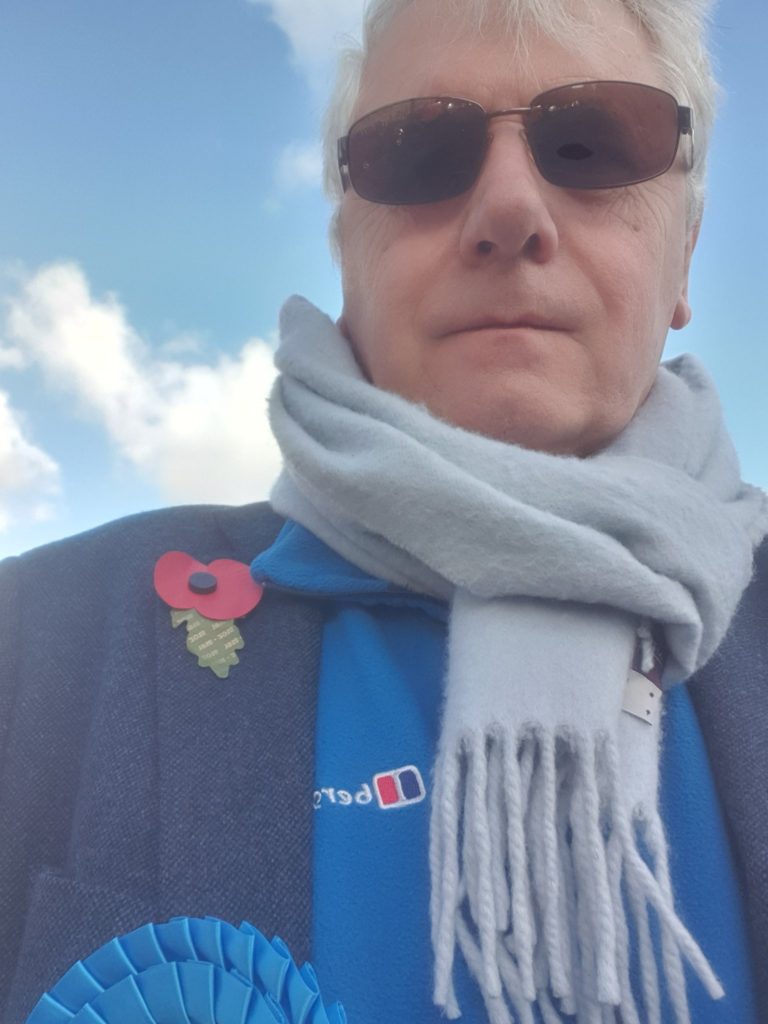
“I am concerned that it will just be used by Labour and others to give some pseudo-legitimacy for their usual complaining about the government whilst they themselves do little or nothing”
You have written for Conservative Home about Climate Change and the council’s committee. What do you think of the committee and what as a country we should be doing on climate change?
Climate change is the big issue of our time. I have been relatively quiet about it because I don’t like to express an opinion on a complex subject till I have acquired a decent level of knowledge. I’ve been working on that on and off for close to a year and I am now confident enough to express an opinion. I expect to write again on the subject, along with others.
The UK government has taken a leading role internationally, something for which it does not get enough credit. Unfortunately, but unsurprisingly, the issue has been hijacked by the usual far left suspects as a trojan horse for their anti-capitalist ambitions. Locally I am supportive of real action by the Council to make a measurable difference, but the Labour Council has set up a group that is unrepresentative of public opinion. I am concerned that it will just be used by Labour and others to give some pseudo-legitimacy for their usual complaining about the government whilst they themselves do little or nothing to make a difference on the Council’s carbon emissions.
“I believe constructive and robust dialogue leads to improved understanding and better solutions. Suppressing free speech hurts us all”
Writing at a time of Coronavirus it’s difficult to see ahead but what would you like to see from the new Government over the next few years?
We need to get through the pandemic and come out the other side positively. Right now we have an invisible enemy to fight. Economy and other matters are rightly taking a back seat. But we are building up an even bigger debt mountain than we had already. Who knows where the economy might go? The government needs to lead us in bouncing back. I think Boris is the man to do that. He has done a great job so far and I think that will continue.
Brexit must be delivered. I thought that on balance Brexit was the right choice but was not dogmatic. I thought we would be fine whether we stayed in or left, although I had been concerned on the direction the EU was taking for some years. Once the decision was taken then it had to be delivered. I was disappointed that some MPs did all they could to prevent it. I think we will see the upside quite soon if the government takes advantage of the opportunity.
I would particularly like the tide to be turned on the erosion of free speech. No platforming, especially at universities, is very concerning. As we have already talked about, I believe constructive and robust dialogue leads to improved understanding and better solutions. Suppressing free speech hurts us all.
Robert can be found on Twitter at https://twitter.com/moguloilman

Leavers of Croydon Drinks – New Addington
Drinks to celebrate our independence from the EU. Chance to meet:
- Neil Garratt Conservative – GLA Candidate.
- Peter Sonnex – Brexit Party PPC for Croydon Central.
- Mark Johnson – Chairman of Croydon Conservative Federation and Vote Leave organiser for the area.
Join us at the The Randall Tavern. Field Way, New Addington, Croydon CR0 9DX.
From 7:30pm, Saturday 21st March.
